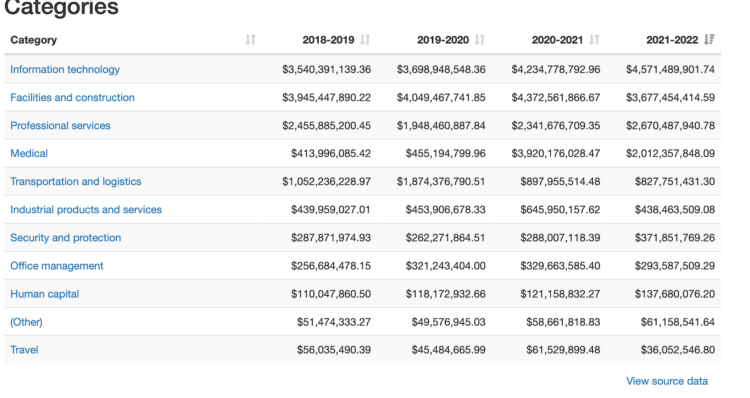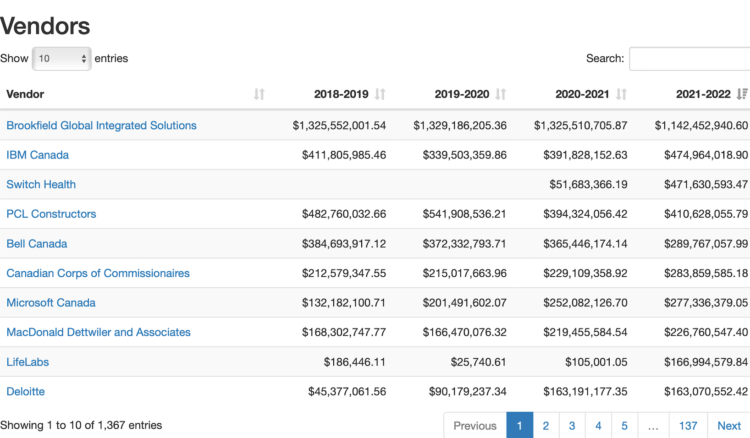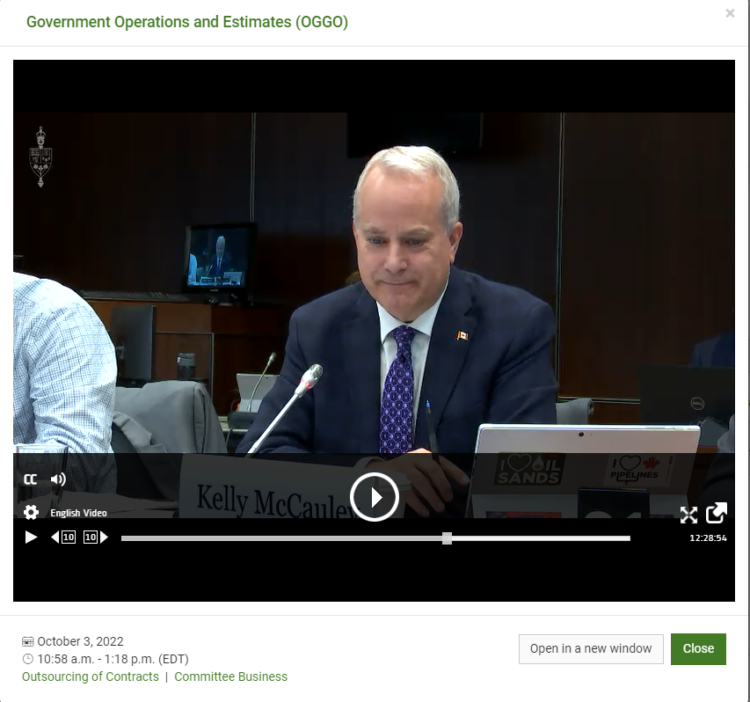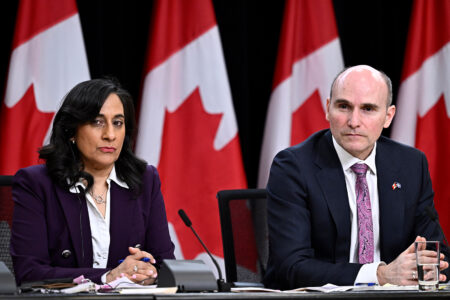
This article originated in The Functionary, our newsletter about the public service. You can read previous editions and subscribe here.
A parliamentary committee is trying to unpack the $15-billion back hole of spending federal departments spend on contracting.
Not sure how much progress MPs will make with four hearings.
A big question for MPs on the government operations and estimates committee: why is the public service growing in leaps and bounds while outsourcing is exploding right alongside that growth in the bureaucracy? MPs want to know if taxpayers are getting value for money using all these contractors. They have become a “shadow” or ghost public service that can dodge the staffing rules bureaucrats have to follow.
How big is big? A Carleton University research team has been digging into contracts to get a handle on how many billions are spent and on what. Last year, it estimated the government spent $15 billion, and $4.7 billion was on IT contracts.
A big part is amendments. About 272,075 contracts have been active since 2017-18. About 16 per cent of them have been amended at least once. These amendments added $25.6 billion to the original cost.
On average: Contract duration is about 10 months and is worth $423,000 (for contracts over $10,000).
Longest: 34.8 years (June 2015 to March 2050 for the consortium to replace the Champlain Bridge in Montreal).
Biggest: $5.7 billion to Brookfield Global Integrated Solutions for office building management.
ArriveCAN: The committee’s probe comes at the same time as a head-scratching revelation that the cost of the much-reviled ArriveCAN app is on track to hit $54 million. Stunned, app developers say it could have been done for about $1 million. Even public servants are aghast. There is a shortage of app developers in government. One long-time official, who is not authorized to speak about the subject, argued the app’s development should have been contracted out to the experts. Trying to build inhouse, where there’s a shortage of the right skills, means bringing in an army of consultants.
Some MPs on the committee want to have a separate probe into why developing the ArriveCAN app cost so much.
Here’s a look at some of the $15 billion in contracting costs across the government of Canada, according to a Carleton University research project:


CONTRACTING 101
Why does it matter? Why do it?
The Professional Institute of Public Service of Canada (PIPSC) has long been consumed by outsourcing – especially for IT – and has done a number of reports. It concludes outsourcing means higher costs and lower quality services for Canadians. It erodes transparency, accountability and the institutional knowledge of the public service.
The fact is departments will always need to outsource for expertise they don’t have, especially for IT and digital talent to modernize government and services for Canadians.
The I-need-it-now pace of the public service picked up during the pandemic. Now a global talent shortage meets the public service’s turtle-slow hiring process. Departments can’t wait. They contract.
Why does it matter?
- About $15 billion a year is spent on contracts in the core public service. (The Liberals also promised when elected to reduce spending on consultants to 2005-06 levels.)
- It strikes at the heart of the kind of work the public service should be doing and what should it contract out, says Conservative MP Kelly McCauley. “A lot of lot these (consultant) reports should be done by our ever-expanding public service. So, what does this say…. about size of our public service if we have to source out so many contracts to the Deloittes of the world?”
- Accountability. It raises questions about influence and who has the government’s ear in making policy and decisions.
- Then there is question of value for money when both contracting and hiring is increasing but services don’t seem to be getting any better. We saw a summer of delays for passports, immigration applications and at airports. NDP MP Gord Johns has asked: “What steps are being taken to ensure that the quality of the service to the public and to other government departments is the first order of business?”
These questions will become even more important when the inevitable spending reviews and cuts come.
Main reasons departments contract:
- They need special expertise and have no in-house skills to do the work.
- Talent shortage, major recruitment and retention issues for the full gamut of IT work.
- The time to hire staff, often months, is too long to meet the ever-shortening deadlines of the work.
- Surges in workload.
- No funding of public servant positions so departments use operating budgets for contracts.
IT contracts will become even more important as all governments push to modernize services. Digital expertise, hiring and contracting them, is central to Canada’s Digital Ambition, to modernize. In a speech, Treasury Board President Mona Fortier outlined her IT priorities: “escaping the trap” of decades-old legacy systems, establishing digital credentials so that Canadians can securely access all government services online, and pursuing a strategy to recruit, keep and develop in-house digital talent.
How the pandemic made the case for digital government reform
Where’s Treasury Board? Treasury Board is the employer and rules-maker, but the actual authority for contracting and human resources has been turned over to deputy ministers to manage their departments.
“Does Treasury Board have any role apart from setting a general framework,” asked McCauley. “Does Treasury Board as a guardian of the public purse ever follow up on any of these contracts that are sent out?”
Last week, MPs were all over the map during the first hearing, questioning contracts from big IT projects to cleaning services and everything in between. They grilled bureaucrats to get a handle on what is outsourced and why.
Finally, Conservative MP Kelly McCauley threw up his hands (watch here, at 12:28:30) and asked:
“I just want a quick question to the three departments here. Just a real quick yes or no if you believe taxpayers are getting fair value for the money, the billions being spent on outside or outside contracts. Just a quick yes or no?”
No takers. Crickets.

“Bueller? … Bueller,” he asked. (Classic 1986 hit movie reference.)

McCauley also noted his disappointment that publics servants testified remotely rather than attended committee in person. He pointedly noted that “perhaps in future, we’ll see folks actually come to committee.”
So, what’s the protocol? Public servants are back to the office as hybrid workers; Parliament is hybrid – at least until June 2023.
The House of Commons has long offered videoconferencing as an option for witnesses. There are no hard-and fast rules, but officials say in-person appearances are a show of respect and can support a better exchange of information with MPs.
Here’s the gist: If a committee doesn’t specify, witnesses can testify in-person or virtually. A committee, however, can always express a preference.
Of course, not all public service witnesses are in Ottawa. If more remote work takes hold as expected, more bureaucrats will be working outside the National Capital Region. And will MPs be willing to give up the flexibility to attend Parliament virtually after June?
What’s next for the contracting study? More hearings to be scheduled. Also, the NDP has proposed a motion to ask the auditor-general to audit Treasury Board’s guide for cost estimation and “make or buy” decisions.
This article was produced with support from the Accenture Fellowship on the Future of the Public Service. Read more of Kathryn’s work here.










